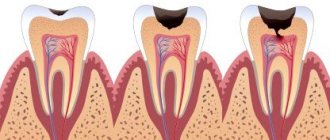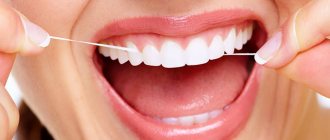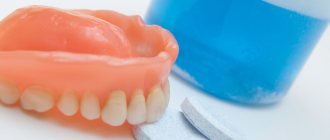A foreign taste in the mouth not only causes discomfort and prevents you from enjoying your favorite food, but also often indicates health problems.
The occurrence of a metallic taste in the mouth is familiar to a large number of people: this sensation is not the most pleasant, but not all of those who have encountered it try to find out its cause. There is nothing wrong with if the iron taste in the mouth appears once, but if it occurs periodically, then the reasons for this phenomenon should be found out.
Quite often you can hear complaints about a metallic taste in the mouth: why does it appear and how to get rid of it?
The reasons that cause an iron taste in the mouth can be very different: when faced with this symptom, you need to try to determine how often it occurs, and whether it is accompanied by any other signs.
First of all, it is worth clarifying what a metallic taste in the mouth is: it is unlikely to confuse this phenomenon with anything else, since it is a pronounced bitter taste with sour notes - a fairly accurate understanding of this taste can be obtained by touching the battery with your tongue . Often the appearance of such a taste is accompanied by an astringent sensation in the mouth and tingling of the tongue (partial numbness is also possible).
Metal taste as a symptom of oral diseases
Patients with gum problems often complain of a strong metallic taste that occurs repeatedly throughout the day. The most popular diseases that provoke such unpleasant sensations include periodontitis and gingivitis, which are accompanied by bleeding gums, and many people describe the taste of blood as metallic. It usually appears during brushing your teeth and after eating. Some patients feel as if there is a foreign body in the mouth, which causes serious inconvenience.
Loose teeth and tartar build-up can also cause a metallic taste. There is no point in trying to independently identify the causes - it is better to immediately contact a dentist.
What can cause bad breath?
Xerostomia
Most often, an unpleasant odor occurs due to xerostomia - the death of tongue cells due to lack of saliva. Xerostomia is the main cause of bad breath in the morning. During the day, dead cells are washed away by saliva and the liquids we drink. At night, much less saliva is produced, the cells die in greater numbers and remain on the surface of the tongue. Bacteria actively eat them and produce those same bad-smelling compounds.
Eliminating halitosis caused by xerostomia is quite simple. Need to:
- Establish a drinking regime so that the body receives enough water;
- In the morning and evening, thoroughly brush not only your teeth, but also your tongue. For this, it is better to use a special brush, but a regular toothbrush will do just fine;
- Rinse your mouth with water several times throughout the day, especially after eating.
What happens if all this is not done: bacteria remain on the tongue, and since they have enough food - dead cells that also remain on the surface, they actively multiply. The more microflora in the mouth, the more hydrogen sulfide, ammonia and methyl mercaptan they produce, and the stronger the odor from the mouth.
Xerostomia can be caused by functional disorders of the salivary glands. Due to inflammation or other reasons, little saliva is produced and or it is too viscous to fully clean the mouth. In such a situation, you need to consult a doctor.
Geographic tongue (desquamative glossitis)
This is the name for a condition in which smooth pink spots appear on the tongue. Compared to healthy tissue, they look like bald spots. In this article we will not delve into the causes of this condition; there are quite a lot of them, and the pathology itself has not been fully studied.
With glossitis, the surface of the tongue becomes heterogeneous and a dense coating may form in the depressions (in the spot area). It is poorly washed off by saliva, so it becomes a favorable environment for the growth of bacteria.
How to eliminate bad breath in this case
It is quite difficult to combat halitosis in this situation. First of all, you need to find and eliminate the cause of glossitis. Regular rinsing with warm water or special rinses helps reduce the unpleasant odor.
Poor hygiene
Plaque constantly forms on the surface of the teeth. It consists of food debris, saliva, dead epithelial cells, as well as bacteria and their waste products. If a person brushes his teeth well 2 times a day and uses floss, this plaque is regularly removed. If hygiene is poor, part of the plaque remains on the teeth and hardens.
Hardened plaque is tartar that cannot be removed with a toothbrush. It is also an ideal “home” for bacteria. In the porous structure of the stone, food debris and other “delicacies” settle, which the microflora happily feeds on. And the more food bacteria have, the more smelly volatile compounds they release.
How to eliminate an unpleasant odor in this situation
Just starting to brush your teeth well is not enough; you won’t be able to remove tartar with a brush and floss. We do not recommend trying to do this with abrasive toothpaste or folk remedies. They are useless against tartar, but can damage tooth enamel.
You need to start with professional teeth cleaning. This procedure is performed only in a dental office using special equipment, instruments and tools. In many cases, this action alone is enough to get rid of bad breath. During cleaning, the doctor completely removes tartar, plaque, and with them the bacteria that live in them. There is no one else to release hydrogen sulfide with ammonia and your breath becomes fresher. How long the effect will last depends on how well the patient takes care of his teeth.
Diseases of teeth and gums
Heavy breathing almost always accompanies gingivitis, periodontitis and periodontal disease. An unpleasant odor in such diseases can be one of the first symptoms, along with bleeding gums.
Periodontal pockets, which form due to gum disease or poor brushing of teeth, can also cause bad breath. They accumulate food debris and dental plaque, that is, an ideal environment for bacteria is formed.
People with carious teeth often suffer from bad breath. The more units affected and the deeper the damage, the stronger the smell. Neither toothpaste nor rinses help get rid of it, since the source is inside the tooth. Interestingly, patients themselves rarely experience bad breath from caries.
What to do
Option one is to eliminate the cause. In such a situation, only treatment of bad breath at the dentist is effective, that is, treatment of caries.
Dentures, plates and braces
It is difficult to brush your teeth properly when there are foreign structures in your mouth. Residues of food can get under removable and bridge dentures and accumulate around the locks of the brace system. Bacteria, of course, will not miss the chance to have a feast in these areas and multiply their numbers several times. What happens next, you already know.
The only way to combat the smell in this case is good hygiene. It is especially important to carefully care for the oral cavity for those who wear removable dentures. The materials from which they are made absorb unpleasant odors and themselves become its source. In this case, the bad breath does not disappear after brushing your teeth, and you will have to change the denture.
Why there is an iron taste in the mouth: reasons not related to disease
If you notice an iron taste in your mouth, you should not immediately panic: there is a possibility that the unpleasant sensation is not associated with diseases.
It may appear due to:
- drinking mineral water with salts (often this product is enriched to compensate for iron deficiency in the body);
- drinking low quality drinking water (for example, supplied to the home through old rusty pipes);
- tongue piercing (the sensation appears as a result of the metal reacting with certain foods);
- using cast iron and aluminum cookware when preparing and eating food.
What does an unpleasant odor mean?
Halitosis is a phenomenon of bad breath.
This phenomenon of bad breath is called halitosis. In fact, there are quite a few reasons that can cause such trouble.
But, if we take into account that this problem is related to the stomach, it is worthwhile to find the cause and possible disease as quickly as possible.
A very common problem that contributes to bad breath is problems with the digestive system. Everyone knows about such a disease as gastritis, many are even familiar with it. This is the first, most common disease, which gives such a symptom as halitosis.
Also, a disease such as an ulcer gives the same symptoms. Accompanied by bad breath, there may be dysbacteriosis, flatulence, constipation, diarrhea, gastroenterocolitis, duodenitis. There are stomach diseases that are caused by bacteria, viruses, allergies, all of which can cause halitosis.
This symptom can occur due to both food and drug poisoning.
Medical causes of metallic taste
If a metallic taste appears in the mouth, this may indicate illness. Their list is very extensive. To make it easier to classify, diseases can be divided into two groups: dental and non-dental.
Diseases that lead to a metallic taste, which are systemic in nature and are not associated with teeth and gums, are as follows:
- diseases of the ENT organs (sinusitis, otitis, laryngitis, etc.);
- lung diseases (pneumonia, tuberculosis);
- diseases of the gastrointestinal tract (gastritis, cholecystitis);
- diseases affecting the nervous system (sclerosis, tissue tumors);
- anemia due to deficiency of iron or B vitamins.
It is not uncommon for a metallic taste to accompany diseases that develop in the oral cavity. These include:
- stomatitis (the mucous membrane of the oral cavity becomes inflamed, which is often accompanied by the formation of small ulcers);
- gingivitis (inflammation of the gums);
- periodontitis (the disease appears as a result of advanced gingivitis, when the infection no longer affects the external tissues, but the periodontium);
- glossitis (formation of plaque on the tongue, its inflammation).
Another common cause of taste associated with the oral cavity and dentistry is the installation of crowns and dentures. The appearance of a taste in this case is normal, provided that it goes away within 1-2 months. A sign that adaptation to the structure in the mouth has not occurred is unpleasant sensations in the form of tingling of the tongue, burning, and a feeling of dryness.
How to eliminate halitosis
Important! You can completely get rid of this symptom only by treating the underlying cause and eliminating negative factors. You can only temporarily remove the symptom on your own.
How to get rid of metal smell:
- rinse your mouth with water and lemon juice or eat a small slice;
- chew ginger, cinnamon or cardamom;
- eat something sweet;
- include citrus fruits and tomatoes in your diet.
Note! Maintaining proper hygiene is also important. When brushing your teeth, you need to pay attention to the tongue, hard palate, gums and the inside of the cheeks. Pathological microorganisms accumulate on the entire surface of the oral cavity, which should be removed with a toothbrush.
How to identify the cause of a metallic taste in the mouth
Only a doctor can identify the correct medical causes and figure out why a metallic taste appears in the mouth after conducting appropriate studies and tests, so you should not hesitate to visit medical specialists.
Measures to identify the cause of unpleasant sensation in the mouth:
- biochemical and clinical blood tests to determine the level of various substances in the body (for example, if hemoglobin is low, this may indicate the development of anemia, a high creatinine level indicates kidney disease);
- a detailed dental examination, during which the general condition of the teeth and gums is determined;
- hormone level test;
- X-ray (used both in case of suspected diseases of the gastrointestinal tract and in the dental field);
- MRI, gastroscopy and various other methods depending on the type of disease detected.
Diet
The diet will help improve digestion.
There are general rules that can significantly improve digestion and help with stomach pathologies, thereby getting rid of unpleasant symptoms. The first thing you should do is adjust your diet:
- Be sure to include healthy foods;
- Eliminate fast food;
- Refrain from taking processed foods;
- You should not eat spicy food;
- Carbonated drinks are prohibited.
The diet itself should consist of frequent meals, but in small portions. When creating a menu, you should pay attention to the following products:
- Be careful when consuming sugar and carbohydrates, if possible completely eliminate them from the diet. The same applies to confectionery products.
- As for fatty foods, they should be consumed in small quantities.
- Also reduce your consumption of fried and salty foods.
- It is better to limit yourself to drinking coffee and tea during the treatment period. But you should avoid products such as milk and cottage cheese.
- If possible, consume meat in limited quantities.
- Everyone knows about the benefits of fruits, but few people know that they cause fermentation and bloating, so you should exclude plums, grapes, and sour apples.
- But fermented milk products will be very useful. They have a beneficial effect on digestive processes and restore the balance of microflora. It is worth paying attention to those products that contain acidophilus and bifidobacteria.
- Vegetables and fruits contribute well to normal digestion, with the exception of those that cause fermentation. In addition, they saturate the body with vitamins.
- Do not forget about drinking water, which is very important and necessary for the body.
Metal structures in the mouth
After installing braces and crowns, dentists warn patients about the possible appearance of a metallic taste - this is a normal phenomenon that should subside within a week after the procedure. If this period has passed, and discomfort still makes itself felt, the reasons may be as follows:
- allergy to metal. It is very rare, but taking an allergy test will not be superfluous. If the suspicion is confirmed, the only solution will be a complete replacement of all installed structures;
- galvanism (interaction between metals), which occurs in the case of installation of orthopedic structures made of different materials that interact with each other. If all the crowns and posts are made of the same material and the amalgam fillings are replaced, the problem will disappear.
If you have metal dentures or implants, an iron taste may become noticeable after consuming acidic foods and drinks. Accordingly, the presence of piercings on the tongue or lips can also cause a similar effect.
When is it necessary to consult a therapist?
Sometimes halitosis can be one of the symptoms of a systemic disease of the body: diabetes mellitus, accompanied by the appearance of the smell of acetone, gastritis and peptic ulcers, inflammation of the pancreas or hepatosis of the liver, chronic tonsillitis and sinusitis, inflammatory diseases of the lungs, which are characterized by a particularly unpleasant odor.
In patients with such diseases (especially undiagnosed or in the acute phase), manifestations of halitosis may persist even after complete sanitation of the oral cavity. They should seek advice from a therapist or continue treatment with a specialized specialist - an endocrinologist, gastroenterologist, otolaryngologist or pulmonologist.
Quick appointment Free consultation
Metallic taste in the mouth of people of different sexes
A number of reasons that cause the sensation of metal are divided by gender.
For men who work in mining or in industries that use heavy metals, an iron taste may appear during each shift and disappear after the end of the shift. Long-term wearing of massive metal objects (bracelets, watches) also leads to a similar result, since during prolonged contact with the skin the concentration of ions entering the blood through the pores becomes too high.
Women may experience a metallic taste due to:
- pregnancy. Many expectant mothers note that a metallic taste periodically appears during pregnancy. Why does this happen? Firstly, the matter may be a lack of microelements and vitamins, and secondly, changes in hormonal levels and malfunctions in the functioning of receptors that recognize taste can be to blame;
- the use of weight loss drugs and various biological additives, which often leads to poisoning due to incorrect dosages and the desire to quickly get the most pronounced result possible;
- insufficient amount of fluid consumed (women resort to this remedy to lose weight and get rid of swelling). A metallic taste is one of the signs of dehydration.
It is best to start combating this not very pleasant feeling by visiting a doctor who will prescribe the necessary tests and examinations. Otherwise, you can look for reasons on your own and continue to experience discomfort regularly for a very long time.
Diabetes
Diabetes mellitus is characterized by a violation of the absorption of glucose by the body's cells, which ultimately accumulates in the blood, causing the destruction of the walls of blood vessels in all internal organs and skin.
It is this manifestation of diabetes that can cause a taste of blood in the mouth. That is, the thinnest vessels of the mucous membrane of the mouth and gums burst and bleed. Symptoms of diabetes include constant thirst and long-lasting wounds. If a person experiences all of these manifestations at once, he needs to urgently undergo examination by a doctor and receive a referral for treatment. Otherwise, it may end in diabetic coma and death.
List of diseases that can be detected
Despite the fact that halitosis is not a disease, it is an important diagnostic symptom by which a specialist can assume the presence of a certain disease in the body. Suspected health problems may include:
- diseases of the nose and nasopharynx: sinusitis, pharyngitis, tonsillitis, adenoiditis;
- food allergies or respiratory rhinitis causing nasal congestion;
- dental diseases of teeth and gums;
- Gastrointestinal diseases: gastritis, increased stomach acidity, intestinal dysbiosis, etc.;
- endocrine disorders: diabetes, thyrotoxicosis, etc.
As can be seen from this impressive list of diseases, solving breathing problems can fall within the competence of a variety of highly specialized specialists: otolaryngologist, dentist, gastroenterologist, endocrinologist.
Other causes of unpleasant odor
If your child's breath smells like iron, the cause may be drinking untreated tap water. In this case, the problem can be solved by installing filters for water purification. An unpleasant taste or odor in this case may indicate that there is a large amount of iron in the water. Typically, an increased concentration of iron is due to the poor condition of water pipes or the mineral composition of the soil. In this case, the settled water becomes dark rusty.
In some cases, such a smell may appear if food is consumed from low-quality aluminum cookware. In this case, you just need to avoid consuming products from low-quality dishes.










